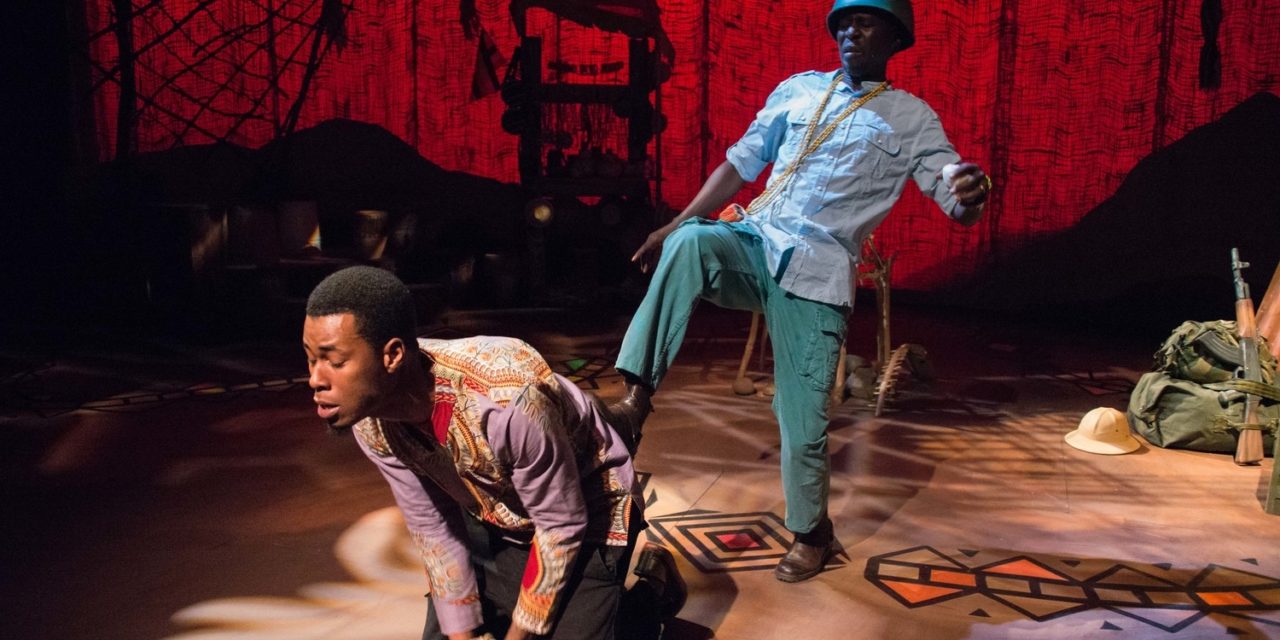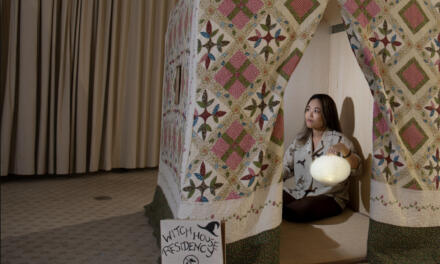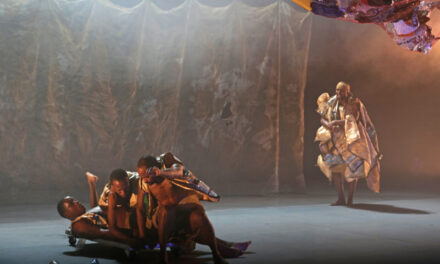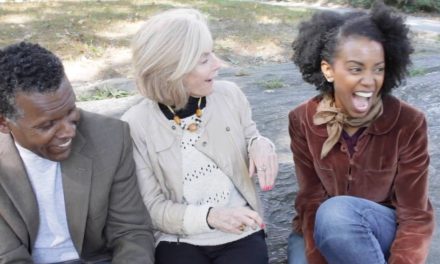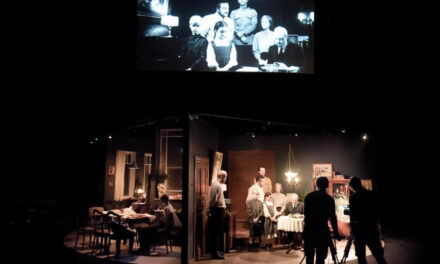TheTheatreTimes correspondent Amelia Parenteau interviews Ugandan writer/performer Okello Kelo Sam and director Kevin R. Free about Sam’s one-man show, Forged in Fire, about his experience as a child soldier, his brother’s abduction and murder, and the inner strength it takes to go on.
Okello Kelo Sam has a life story so filled with tragedy and hope that it seems naturally suited to the stage, where the audience can truly be present and attentive enough to absorb every detail. As Sam says in his original one-man show, Forged in Fire, playing at CUNY’s Voorhees Theatre May 2nd-15th, “You think the stories are exaggerated? What a luxurious way to think.”
At the age of 16, Sam was abducted by the now defunct UNLA of General Bazil Olara Okello on his way to school and was forced to fight rebel battles in Sudan and Northern Uganda after being brainwashed and tortured for two weeks of basic training at his own high school. He escaped 18-24 months after being captured and traveled to the capital city of Kampala to find an uncle who would take him in ,since his home village had been deserted. In Kampala, with the remarkable strength and ambition that has carried him through his entire life, Sam worked to earn enough money to continue his studies and soon was pursuing a performance arts degree at Makere University. There, he met his wife, also a student of the performing arts, and they had their first child, a daughter named Lawino Mieke Marilyn. And that is only the beginning of Sam’s story.
In 1996, Sam’s teenage brother Godfrey was abducted from boarding school by Joseph Kony’s Lord’s Resistance Army. His whereabouts were unknown for two years, although, as Sam says in Forged in Fire, “I had a feeling that he was still alive because if he was dead, I would have heard from him in my dreams.” Then, one morning in 1998, Sam opened the paper to see horrific photographs of 300 people killed and dismembered in his home village. Sam says, “When I got the news, I just broke down. So I get into my car, driving toward the North, just doing it out of anger, out of frustration, so many of the people you know have died and you don’t know what else to do.”
As he drove, Sam was struck by the idea of sanctuary, and thereby founded Hope North, a school for children who had been displaced by the war as orphans, refugees, or former soldiers. Sam says, “School was becoming a demon because of these abductions when it was supposed to be a place for the progressive development of humankind. I started Hope North to bring back the original meaning of school.”
Sam raised money for the school by giving free performances of traditional Ugandan dances at private schools all over the country, in exchange for scholarships for students from Northern Uganda. He purchased land in Kitwanga Village, an area protected by the Nile River from the war zone, and the school is now home to 250 youth who are in the process of healing their old wounds and planning for their future careers.
Sam also leads the Mizizi Ensemble, which he founded in 2009. The Mizizi Ensemble is a residence for impoverished youth from all regions of Uganda to learn traditional art forms including dance, music, storytelling, instrumentation, and instrument making. The students put these skills to use in weekly performances in Kampala, which help raise the money for their scholarships. Regarding his work with students at Hope North and in the Mizizi Ensemble, Sam says, “When you go through tragedy, you have to deal with it. Art provides that platform for detoxification, not only for you, but also for the people watching, because everybody has their own stories.”
Putting this philosophy into practice, every night at Hope North the students engage in community dancing around a bonfire, where they sing and act out their own stories. Sam says, “Everyone is building in this big creative process, and so they begin to need and trust each other. A lot of these children have lost their trust and are always skeptical, but this is where they begin to open up. Music allows you to achieve those feelings that are difficult to reach.”
The students at Hope North also travel with the short plays they create (often in a similar style to Augusto Boal’s Theatre of the Oppressed), addressing lead questions that prompt discussion with their audience around subjects such as sustainable agriculture, HIV/AIDS, and sexual violence. Since access to media is prohibitively expensive in most of Uganda, and government-funded social support systems are lacking, Sam finds that theater is an invaluable medium, both for exposing people to these issues and opening up dialogue with them.
Sam is following the same path to healing through the performing arts in adapting his brother Godfrey’s story for the stage in Forged in Fire. Sam plays three characters: himself, a tour guide, and a commander, to share the story of his brother’s life and death. Observing a rehearsal this week directed by Kevin R. Free, it was evident how difficult and how necessary this act of storytelling is for Sam. At one point in the rehearsal, he admitted that he doesn’t like the tour guide character because every one of his lines is flush with irony, but Sam puts his own feelings aside for the good of the show. Sam says, “The kind of theater I’m used to is different. Everything here is very specific. Also, in Uganda, I’m used to being in charge, and so I’m torn between fears, here.” And yet, the camaraderie between Sam and Free is palpable, and Sam, perhaps teasingly, says that he hopes one day this show will tour with Free playing his role.
Free, too, has overcome great tragedy in his life, as his mother died on Christmas Day when he was six years old. It is a story that Free has shared onstage, which gives him a deeply empathetic perspective in directing Sam’s play. Free says, “On the first day of rehearsal, I told Okello, ‘I’m going to be patient, kind, and relentless with you,’ because I know how it is. The experience of talking about my mother’s story in a results-oriented way, drudging up those feelings again, was awful. But when I tell it right, it feels like a victory lap, like I am actually paying tribute to her. I want Okello to feel that victory lap.” Sam says it felt like karma, to learn about Free’s story. He elaborates, “This play is very hard for me, because I have to confront the fact my brother died, and I can’t deal with it because I’ve never seen his body. I fear that moment where I confront his death on stage every time we are rehearsing the play, and at the same time, I want to stay there. It’s theater, but it’s life, too.”
Sam originally began writing this piece with the help of Laura Edmonson, a Fulbright scholar in Uganda who recorded his stories and helped develop them into a script. Edmonson’s husband, Robert Ajwang, contributed to its development by playing music as they were rehearsing, to see how it would interact with the story. Sam decided to transform Godfrey’s story into a play to continue to celebrate him, because “the performing arts has a life that is endless. In this way, I am creating another life for him to continue to live with me, in another time. My brother’s dreams could have been stopped by war, but here I am using performing arts to tell his story beyond the confines of the human body, of Uganda, and living his dream.” Both Sam and Free believe that life is about posterity, and that you just have to move forward, drawing on love and joy to support you. As Sam says, “Even when we die, we move on.”
Forged in Fire is the ultimate personal is a political story, and Sam is a charismatic performer, making eye contact with the audience throughout the show and directly addressing them. In one standout moment, Sam turns to the audience and asks, “Why do you think that time is limited to your lifespan? Don’t you think about the legacy you leave behind?” Sam and Free hope this piece will put a face on the conflict in Uganda for American audiences, sparking discussion and change. In addition, they both would love for the show to inspire audiences to donate to Hope North, which is funded entirely by contributions from individuals, rather than the support of an NGO. As a Ugandan nonprofit organization, all US donations go through a US fiscal sponsor (another nonprofit), making all donations tax-deductible.
Forged in Fire runs at CUNY’s Voorhees Theatre May 2nd-15th, with evening performances at 8:00 pm and a matinee at 2:00 pm on May 9th. Tickets are available here. Don’t miss your opportunity to bear witness to the life of Godfrey and move forward in celebration with Okello Kelo Sam.
Amelia Parenteau is an American playwright, journalist, translator, and cultural commentator currently living in Brooklyn. She is a graduate of Sarah Lawrence College where she studied writing, theater, French, and gender studies. She has worked with TCG, Ping Chong & Company, The Lark Play Development Center, and The Civilians in New York, and the Eugene O’Neill Theater Center in Waterford, Connecticut. She is a member of the FENCE and the League of Professional Theatre Women, and she has been published in Asymptote Literary Magazine and American Theatre Magazine, as well as Culturebot, Extended Play, and the TCG Circle.
This post was written by the author in their personal capacity.The opinions expressed in this article are the author’s own and do not reflect the view of The Theatre Times, their staff or collaborators.
This post was written by Amelia Parenteau.
The views expressed here belong to the author and do not necessarily reflect our views and opinions.

